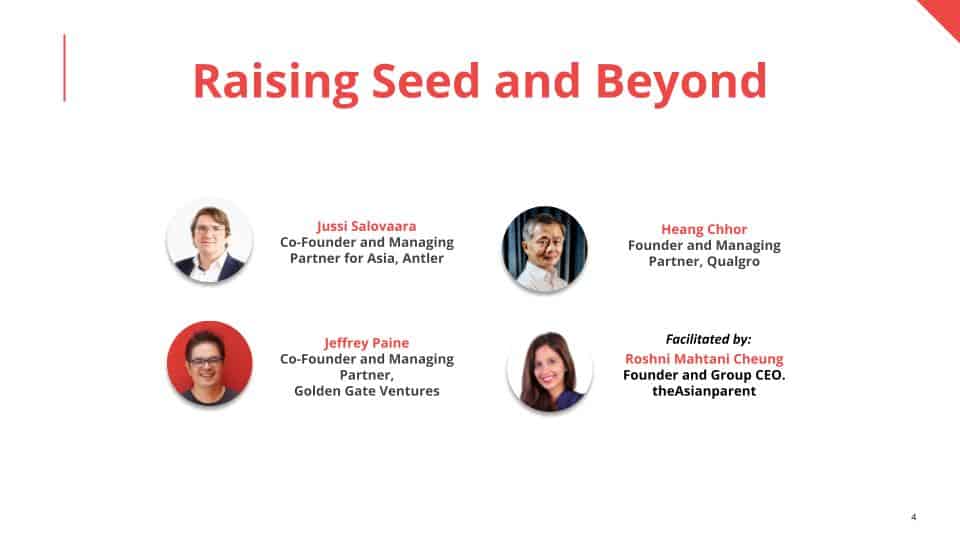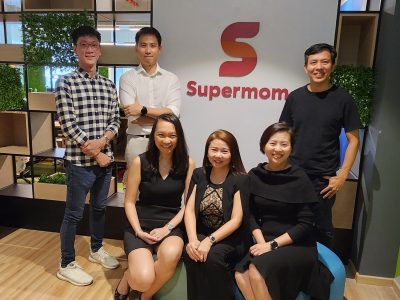Back in January this year, we hosted a small, intimate session with our friends at Antler.
We invited Jussi Salovaara, Co-Founder and Managing Partner for Asia, Antler; Jeffrey Paine, Managing Partner, Golden Gate Ventures; Heang Chhor, Founder and Managing Partner, Qualgro to discuss what investors look at when they screen startups, and how startups should also screen their VCs. This interesting session was moderated by Roshni Mahtani Cheung, Founder and Group CEO, theAsianparent.
What do founders need to fundraise?
For seed and pre-A stages companies, revenue is not a pre-requisite to raising funds from investors. Many investors are more interested in the founding team’s ability to launch a product at the early stages. Heang, the Managing Partner of Qualgro Partners, highlighted the focus on the founders’ quality when he makes investments in early-stage companies. Jeffery, the Managing Partner of Golden Gate Venture, also echoed a similar point. He emphasized the importance of the founders’ ability to articulate a ten-year vision of their company. It is the business of venture capital investors to fund early-stage companies with strong growth potential and founders need to build that conviction in them. Additionally, founders must understand their long-term capitalization strategy. And planning the fundraising amount early works in the favour of the founders in terms of dilution.
What do investors look out for in founders?
“Are you launching the right business with the right people?”, said Heang. Essentially, that is the key question investors ask themselves before investing. For early-stage companies, having the conviction in the founding team is one of the key criteria for Qualgro Partners. Heang went on to list down three main factors: 1) DNA 2) Skillset 3) Mindset.
Firstly, investors will look out for serval key characteristics in the founding team during their initial interactions. Heang mentioned attributes like courage, resilience, vision and forward-thinking. These are some desirable ones that are important to growing a business. For example, during the pandemic, many investors find it a good time to assess founders’ resilience and their ability to pivot their businesses.
Secondly, it is beneficial for founders to have a proven track record of their sectorial knowledge and also execution skills. Startup founders, more often than not, will find themselves facing more ‘downs’ than ‘ups’ in their entrepreneurship journey. Therefore, the most crucial skillset is problem-solving. Founders can demonstrate this ability with anecdotal examples of how they solved practical issues such as hiring key executives and launching its minimum viable product (MVP).
Lastly, having the right mindset is the fundamental quality that other attributes can be built upon. As entrepreneurs, founders should be open-minded in listening to others’ views. To assess this quality, Heang would typically ask founders challenging questions such as “What are the two or three mistakes you have made as a founder?” and he would then assess if they were trying to evade the question or forthcoming. He advised founders to talk about it openly, and explain the lessons learnt from it.
Ultimately, Jussi, Co-Founder and Managing Partner for Antler, advised that every investor have their style of founder fit. Hence, it is most important for founders to be themselves in front of their investors.
How should founders assess their investors?
While it is a common practice for VCs to do due diligence on their potential startups, it is also important for founders to do due diligence on their investors. Heang advised founders to think of two key questions: 1) Can the investors help you to grow your business in the next 12-18 months? 2) Can the investors support you during difficult times? To conduct such due diligence, founders should look at the investor’s portfolio companies and get references from those founders. Founders must recognize that investors are your partners in this journey. When founders understand their investors better, their relationship would be a more harmonious one.





